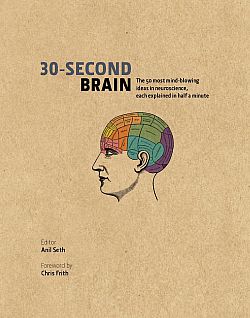Quick thinking: New book explains the brain in 30-second chunks
Sussex brain experts have put their heads together to explain 50 of the most mind-blowing ideas in neuroscience, each in less than half a minute, for a new book (to be published on 6 March).
 Brain store: Many parts of the brain take on specialist memory functions, according to content (such as knowledge versus past events) or process (such as recollection versus familiarity).
Brain store: Many parts of the brain take on specialist memory functions, according to content (such as knowledge versus past events) or process (such as recollection versus familiarity).
Challenging ideas about whether brain training can really improve your IQ, or if reason and emotion are opposites, 30 Second-Brain (Icon Books), edited by University of Sussex neuroscientist and Co-Director of the Sackler Centre for Conscious Science Professor Anil Seth, is aimed at anyone and everyone who is interested in how the brain works, what happens when it goes wrong, and how it helps define who we are.
Sussex contributors include, Professor Jamie Ward, whose research is largely devoted to our understanding of unusual perceptual experiences, such as synaesthesia, in which one sensation (e.g. taste) may trigger another (e.g. the association of a colour with that taste); Professor Michael O’Shea, who writes about the structure of the brain and how our 90 billion neurons (brain cells) chatter among themselves to conjure up our self-awareness; and Dr Daniel Bor, who puts into simple terms how we now know that different areas of the brain are specialised for different functions, such as memory.
Professor Seth, who together with his colleague Dr Ryota Kanai reveals the latest knowledge on consciousness, says the collection is not at all exhaustive and its main purpose is to whet readers appetites rather than be a whole '”brain banquet”.
“Together with my co-authors we went through several stages of winnowing down a long list of topics. In the end, I believe we’ve come up with a selection that takes us from the basic building blocks of the brain all the way to how the cognition, perception, and even how understanding the brain can help us think about our role in society.
“The content was also shaped to take advantage of the particular expertise of the authors; for instance I was keen to include a whole section on 'consciousness', my own main research topic!”
He adds: “I strongly believe that even complex ideas can be explained simply, if one chooses the right aspects to explain. Of course each '30-second' summary could be the basis of an entire book, but that's just the point.
“The ideas are presented in a way accessible to anyone, from teenagers to pensioners, without any particular background - just some desire to understand. But because it’s completely up-to-date and written by experts, even those already in the field will find there are new and compelling ways to explain complex phenomena.”
